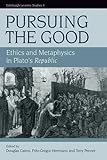Pursuing the Good : Ethics and Metaphysics in Plato's Republic / Terrence Penner, Douglas Cairns, Fritz-Gregor Herrmann.
Material type: TextSeries: Edinburgh Leventis Studies : ELSPublisher: Edinburgh : Edinburgh University Press, [2022]Copyright date: ©2007Description: 1 online resource (352 p.)Content type:
TextSeries: Edinburgh Leventis Studies : ELSPublisher: Edinburgh : Edinburgh University Press, [2022]Copyright date: ©2007Description: 1 online resource (352 p.)Content type: - 9780748628117
- 9780748631889
- online - DeGruyter
| Item type | Current library | Call number | URL | Status | Notes | Barcode | |
|---|---|---|---|---|---|---|---|
 eBook
eBook
|
Biblioteca "Angelicum" Pont. Univ. S.Tommaso d'Aquino Nuvola online | online - DeGruyter (Browse shelf(Opens below)) | Online access | Not for loan (Accesso limitato) | Accesso per gli utenti autorizzati / Access for authorized users | (dgr)9780748631889 |
Frontmatter -- Contents -- Preface -- Contributors and Editors -- Introduction -- 1. What is the Form of the Good the Form of ? A Question about the Plot of the Republic -- 2. Glaucon’s Challenge, Rational Egoism and Ordinary Morality -- 3. Thrasymachean Rulers, Altruistic Rulers and Socratic Rulers -- 4. Neutralism in Book I of the Republic -- 5. The Good, Advantage, Happiness and the Form of the Good: How Continuous with Socratic Ethics is Platonic Ethics? -- 6. The Form of the Good and the Good in Plato’s Republic -- 7. Flourishing: The Central Concept of Practical Thought -- 8. Is Plato’s Conception of the Form of the Good Contradictory? -- 9. The Good, Essences and Relations -- 10. The Idea of the Good and the Other Forms in Plato’s Republic -- 11. The Aporia in the Charmides about Reflexive Knowledge and the Contribution to its Solution in the Sun Analogy of the Republic -- 12. The Good and Mathematics -- 13. The Good and Order: Does the Republic Display an Analogy Between a Science of Ethics and Mathematics? -- 14. Inquiry and Justification in the Search for the Highest Good in Plato and Aristotle -- 15. The Carpenter and the Good -- 16. Conversion or Conversation? A Note on Plato’s Philosophical Methods -- Index
restricted access online access with authorization star
http://purl.org/coar/access_right/c_16ec
This volume, the fourth in the Edinburgh Leventis Studies series, comprises a selection of papers from the conference held in Edinburgh March 2005 in conjunction with Professor Terry Penner's tenure of the A. G. Leventis Visiting Research Chair in Greek.It brings together contributions from leading Plato scholars from Britain, Europe and North America on a closely defined topic central to Plato's thought and to Ancient Philosophy - Plato's Form of the Good. The importance of the collection lies in the combination and presentation in one place of a range of different approaches to the good in Plato's Republic, and different solutions to the problems posed and proposed by these approaches. The two central issues, which form an underlying thread throughout the collection, are: first whether Plato's Republic is centred on what is good for individual humans, or on some quasi-moral good; and secondly, what the Form of the Good is. Pursuing the Good goes beyond recent studies in the field, and will appeal to classicists and philosophers alike. To the advanced student, it represents a wide-ranging introduction to central issues of Plato's philosophy; for the academic it will provide stimulus through antithetical and controversial solutions to questions old and new.
Mode of access: Internet via World Wide Web.
In English.
Description based on online resource; title from PDF title page (publisher's Web site, viewed 29. Jun 2022)


